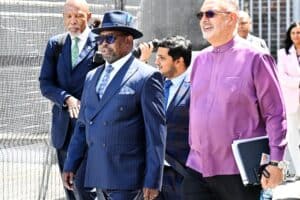Some stakeholders receive extension for submissions to Davis Tax Committee.

As attractive as it may be to tax the wealthy, it seems that the proposed wealth tax options put forward by the Davis Tax Committee (DTC) will be extremely complex to introduce and administer, the Fiduciary Institute of Southern Africa (Fisa) has said in its submission.
“While it is understandable that a country like South Africa cannot afford a perception that the tax system fails to tax the rich adequately on their wealth, great care should be taken to avoid hurting the middle class and future high net worth individuals,” Louis van Vuren, CEO of Fisa, notes.
In light of the unequal distribution of wealth in South Africa, the DTC in April called for submissions on the desirability and feasibly of three forms of wealth taxes – a land tax, a national tax on the value of property (over and above municipal rates) and an annual wealth tax. Stakeholders had until May 31 to make submissions, but Moneyweb understands that a number of parties has received an extension to June 30.
The idea of a wealth tax re-emerged after French economist Thomas Piketty mooted it during a visit to the country, but some tax practitioners have expressed concern that the compliance cost and market distortions associated with the tax may exceed the benefits.
Van Vuren says much research will have to be done to determine whether any of the taxes proposed will be efficient in terms of compliance and enforcement cost, compared to yield.
“The existing taxes in South Africa are already highly progressive. Just in terms of income tax those taxpayers with a taxable income in excess of R1 million make up only 3.5% of the total number of taxpayers, while contributing 38.5% of the income tax revenue.
“The poor do not pay any estate duty, donations tax, transfer duty, capital gains tax or income tax. In fact it is submitted that the high level of inequality is not due to a lack of redistribution through the tax system, but more the result of lack of economic growth and the failure of the education system in South Africa to produce entrepreneurs and employable individuals.”
Fisa’s submission notes that all private owners of land are not necessarily wealthy individuals and suggests that a land tax aimed at reducing inequality should take cognisance of this, which means that a threshold value will have to be used.
“Ownership of land is not a very reliable proxy for wealth at a level that should be visited with a wealth tax.
“As a result of a need to discriminate between wealthy and not-so-wealthy land owners, a land tax will have to be so complex that it is doubtful whether it will be an efficient source of fiscal revenue.”
Van Vuren also argues that a national tax on the value of property over and above municipal rates will suffer from some of the same deficiencies as an annual land tax.
Thresholds will have to be introduced and as a result, the ownership of residential property will not be discreet enough as a proxy for wealth. A very wealthy individual may own several pieces of property, which will all fall under the threshold, he says.
“An annual wealth tax will have to be extremely complex in order to target true wealth. The required level of complexity raises serious questions about the compliance and enforcement cost, as well as the ability to enforce.”
In its submission, the South African Institute of Professional Accountants (Saipa), argues that the tax base will not be getting any bigger by introducing wealth taxes.
“It is more likely to shrink the existing tax base.”
In addition, countries like India have taken a decision to abolish wealth taxes and replaced it with the new surcharge on wealthy taxpayers. This can be a lesson to South Africa, Faith Ngwenya, its technical executive, notes.
Erika de Villiers, head of tax policy at the South African Institute of Tax Professionals (Sait), says a number of stakeholders, including professional bodies and associations, were concerned that the deadline for submissions would not allow them sufficient time to prepare their submissions.
“The quality of the first report of the Committee will be directly affected by the quality of the input received from the public including the professions. It was felt that more time is needed to comment on a wholly new tax, on which there are sharply divided opinions.”
Various specialists may need to be consulted, including economists and international specialists, she says.
Brought to you by Moneyweb
Support Local Journalism
Add The Citizen as a Preferred Source on Google and follow us on Google News to see more of our trusted reporting in Google News and Top Stories.






